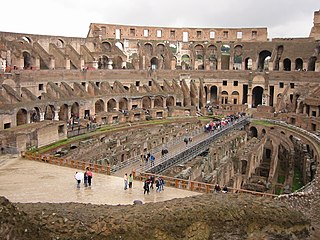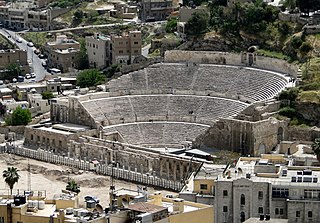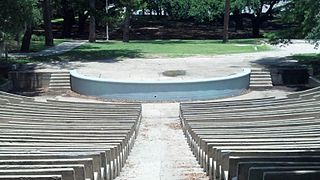
Greek is an independent branch of the Indo-European family of languages, native to Greece, Cyprus and other parts of the Eastern Mediterranean and the Black Sea. It has the longest documented history of any living Indo-European language, spanning more than 3000 years of written records. Its writing system has been the Greek alphabet for the major part of its history; other systems, such as Linear B and the Cypriot syllabary, were used previously. The alphabet arose from the Phoenician script and was in turn the basis of the Latin, Cyrillic, Armenian, Coptic, Gothic, and many other writing systems.

An amphitheatre or amphitheater is an open-air venue used for entertainment, performances, and sports. The term derives from the ancient Greek ἀμφιθέατρον (amphitheatron), from ἀμφί (amphi), meaning "on both sides" or "around" and θέατρον (théātron), meaning "place for viewing".

The hippodrome was an ancient Grecian stadium for horse racing and chariot racing. The name is derived from the Greek words hippos and dromos. The term is used in the modern French language and some others, with the meaning of "horse racecourse". Hence, some present-day horse racing tracks also include the word hippodrome in their names, such as the Hippodrome de Vincennes and the Central Moscow Hippodrome.

A Greek chorus, or simply chorus in the context of Ancient Greek tragedy, comedy, satyr plays, and modern works inspired by them, is a homogeneous, non-individualised group of performers, who comment with a collective voice on the dramatic action. The chorus consisted of between 12 and 50 players, who variously danced, sang or spoke their lines in unison and sometimes wore masks.
Athens is the capital city of Greece.

Epidaurus was a small city (polis) in ancient Greece, on the Argolid Peninsula at the Saronic Gulf. Two modern towns bear the name Epidavros:Palaia Epidavros and Nea Epidavros. Since 2010 they belong to the new municipality of Epidaurus, part of the regional unit of Argolis. The seat of the municipality is the town Lygourio.

The ancient Greek drama was a theatrical culture that flourished in ancient Greece from 700 BC. The city-state of Athens, which became a significant cultural, political, and military power during this period, was its center, where it was institutionalised as part of a festival called the Dionysia, which honored the god Dionysus. Tragedy, comedy, and the satyr play were the three dramatic genres to emerge there. Athens exported the festival to its numerous colonies.

Roman theatres derive from and are part of the overall evolution of earlier Greek theatres. Indeed, much of the architectural influence on the Romans came from the Greeks, and theatre structural design was no different from other buildings. However, Roman theatres have specific differences, such as generally being built upon their own foundations instead of earthen works or a hillside and being completely enclosed on all sides.
The Greek alphabet has been used to write the Greek language since the late ninth or early eighth century BC. It is derived from the earlier Phoenician alphabet, and was the first alphabetic script to have distinct letters for vowels as well as consonants. In Archaic and early Classical times, the Greek alphabet existed in many different local variants, but, by the end of the fourth century BC, the Eucleidean alphabet, with twenty-four letters, ordered from alpha to omega, had become standard and it is this version that is still used to write Greek today. These twenty-four letters are: Α α, Β β, Γ γ, Δ δ, Ε ε, Ζ ζ, Η η, Θ θ, Ι ι, Κ κ, Λ λ, Μ μ, Ν ν, Ξ ξ, Ο ο, Π π, Ρ ρ, Σ σ/ς, Τ τ, Υ υ, Φ φ, Χ χ, Ψ ψ, and Ω ω.

The Theatre of Dionysus Eleuthereus is a major theatre in Athens, considered to be the world's first theatre, built at the foot of the Athenian Acropolis. Dedicated to Dionysus, the god of plays and wine, the theatre could seat as many as 17,000 people with excellent acoustics, making it an ideal location for ancient Athens' biggest theatrical celebration, the Dionysia. It was the first theatre ever built, cut into the southern cliff face of the Acropolis, and supposedly the birthplace of Greek tragedy. The remains of a restored and redesigned Roman version can still be seen at the site today. It is sometimes confused with the later, smaller, and better-preserved Odeon of Herodes Atticus, located nearby on the southwest slope of the Acropolis.
Athenaeum referred to the Athenaeum, a school in ancient Rome. It may also refer to:

The William Randolph Hearst Greek Theatre, known locally as simply the Greek Theatre, is an 8,500-seat amphitheater owned and operated by the University of California, Berkeley in Berkeley, California, USA.

SMG is an American worldwide venue management group headquartered in West Conshohocken, Pennsylvania, that specializes in managing publicly owned facilities. It began their operation in 1977 with management of the Louisiana Superdome. It is one of the largest property management corporations in the world.
Edith Hall is a British scholar of classics, specialising in ancient Greek literature and cultural history, and Professor in the Department of Classics and Centre for Hellenic Studies at King's College, London. From 2006 until 2011 she held a Chair at Royal Holloway, University of London, where she founded and directed the Centre for the Reception of Greece and Rome until November 2011. She resigned over a dispute regarding funding for classics after leading a public campaign, which was successful, to prevent cuts to or the closure of the Royal Holloway Classics department. She also co-founded and is Consultant Director of the Archive of Performances of Greek and Roman Drama at Oxford University, Chairman of the Gilbert Murray Trust, and Judge on the Stephen Spender Prize for poetry translation. Her prizewinning doctoral thesis was awarded at Oxford. In 2012 she was awarded a Humboldt Research Prize to study ancient Greek theatre in the Black Sea, and in 2014 she was elected to the Academy of Europe. She lives in Cambridgeshire.

Marianne McDonald is a scholar and philanthropist. Marianne is involved in the interpretation, sharing, compilation and preservation of Greek and Irish texts, plays and writings. Recognized as a historian on the classics, she has received numerous awards and accolades because of her works and philanthropy. As a playwright, she has authored numerous modern works, based on ancient Greek dramas in modern times. As a teacher and mentor, she is highly sought after for her knowledge of and application of the classic themes and premises of life in modern times. In 2013, she was awarded the Distinguished Professor of Theatre and Classics, Department of Theatre, Classics Program, University of California, San Diego. As one of the first women inducted into the Royal Irish Academy in 1994, Marianne was recognized for her expertise and academic excellence in Irish language history, interpretation and the preservation of ancient Irish texts. As a philanthropist, Marianne partnered with Sharp to enhance access to drug and alcohol treatment programs by making a $3 million pledge — the largest gift to benefit behavioral health services in Sharp’s history. Her donation led to the creation of the McDonald Center at Sharp HealthCare. Additionally, to recognize her generosity, Sharp Vista Pacifica Hospital was renamed Sharp McDonald Center.

Drama is the specific mode of fiction represented in performance: a play, opera, mime, ballet, etc, performed in a theatre, or on radio or television. Considered as a genre of poetry in general, the dramatic mode has been contrasted with the epic and the lyrical modes ever since Aristotle's Poetics —the earliest work of dramatic theory.
This is a list of theatre list articles on Wikipedia. Theatre or theater is a collaborative form of fine art that uses live performers to present the experience of a real or imagined event before a live audience in a specific place. The performers may communicate this experience to the audience through combinations of gesture, speech, song, music, and dance. Elements of design and stagecraft are used to enhance the physicality, presence and immediacy of the experience.














